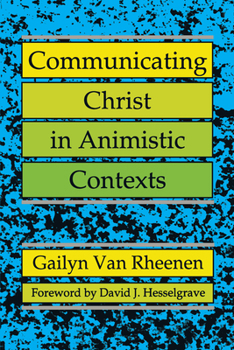Communicating Christ in Animistic Contexts
Select Format
Select Condition 
Book Overview
Whether in New Age mysticism, occultism, Haitian voodooism, Chinese ancestor veneration, or Japanese Shintoism, animistic beliefs are widespread, even today. Gailyn Van Rheenen presents a rigorous, biblical, theological, and anthropological foundation for ministering in animistic contexts.
Format:Paperback
Language:English
ISBN:0878087710
ISBN13:9780878087716
Release Date:June 1991
Publisher:William Carey Publishing
Length:346 Pages
Weight:1.30 lbs.
Dimensions:1.0" x 6.0" x 8.9"
Customer Reviews
2 ratings
Sympathetic Insights on Traditional Worldviews
Published by Thriftbooks.com User , 17 years ago
In this book Van Rheenen presents a comparative analysis of western dualistic secular culture and its worldview with the dynamic integrated worldview of what are often referred to as "traditional" or "animistic" peoples. He explains the characteristics of an "animistic" understanding of the world in such a way as to clarify how characteristics of this worldview are found in various cultures, not just "traditional" ones. I met Van Rheenen when were both working in Kenya years ago. Unfortunately, we were living in different locations and I did not get to know him well. I had various levels of acquaintance and familiarity with the work of various missionaries of the Church of Christ Mission. Van Rheenen worked primarily among the Kipsigis people in the Highlands of Kenya, east of the Great Rift Valley. He presents many experiences from this culture and events from which he learned the cultural worldview of the Kipsigis. I have visited in some Kipsigis churches, but did not have an intimate familiarity with this people. I have read some of the sources he cites in his extensive bibliography. Variety in Animism Because of Van Rheenen's experience in Africa, many of the examples he presents come from various African peoples, Bantu, Nilotic or Atlantic from West Africa. The Kipsigis are part of the Highland Nilotic cluster of peoples. He explains the differences between various peoples whose beliefs and practices fall into this broad category called "animistic." The definition he provides for animism helps the reader to overcome some of the misunderstandings and stereotypes of animism. It is clear from the great variety of practices and beliefs he presents that "animism" is a working term, not in any was a "religion." It is rather a category of worldview that is expressed in various ways, but can be seen to entail a basic set of beliefs about the world and our existence. He provides a more comprehensive definition: "The belief that personal spiritual beings and impersonal spiritual forces have power over human affairs and, consequently, that human beings must discover what beings and forces are influencing them in order to determine future actions and, frequently, to manipulate their power." American Organized Animism In his comparative description of animism, Van Rheenen refers to more traditional forms of organized animistic worship and practice in the Western hemisphere, such as Brazilian spiritism, Condomble and varieties of voodoo. Other sources explain that many sects of the latter are often organized in the form of the Christian pantheon of saints, with a dual name system, a sanit's name and a traditional African spirit name. But he likewise references the variety of practices and beliefs commonly called New Age, as well as various practices of divining the future. A prime example of the latter is the constant practice of Nancy Reagan in consulting astrologers and mediums to determine the best time for President Reagan to make
a biblical & experiential perspective on animism/spiritism
Published by Thriftbooks.com User , 25 years ago
Van Rheenen has thoroughly researched the missiological writings about animism, but he has also experienced it on the field--both in Africa and in North America. He tactfully avoids the "demons and dragons" drama of Frank Peretti's fiction while providing readers with enough real-life anecdotes to take his discussion out of the classroom. He is especially good at helping us to realize that, if we don't live in a way which assumes the existence of the supernatural (God and angels, Satan and demons), then we are practicing logical positivists, if not atheists. The Bible demands their existence, and we cannot claim to follow the Bible if we ignore the reality of the supernatural in our world.Van Rheenen helps readers to recognize the common threads in the various animisms around the world: witchcraft, voodoo, Asian ancestor worship, folk Islam, shamanism, etc. Then, by identifying Satan's strategies in these, he helps Christians to develop biblical strate! gies to resist their enemy.While some of Van Rheenen's discussion may fly over the head of the average reader, most of it is a fine, balanced blend of scholarly study and real-life experience and advice.Perhaps more Christians would buy this excellent book if it read less like a doctoral dissertation.




